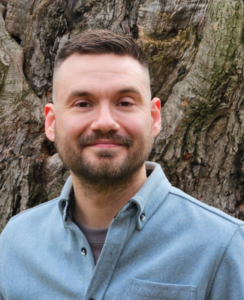Walking the path towards Truth and Reconciliation
Posted on Friday, April 26th, 2024
Algonquin College prides itself on its commitment to Indigenous knowledge and Truth and Reconciliation as part of the institution’s culture. A key part of that is the Indigenous Education Council (IEC), a group of 12 volunteers who are committed to providing support, developing plans and initiatives and guiding the College towards meeting the needs of First Nations, Métis and Inuit communities on campus.
A key part of that is the Indigenous Education Council (IEC), a group of 12 volunteers who are committed to providing support, developing plans and initiatives and guiding the College towards meeting the needs of First Nations, Métis and Inuit communities on campus.
The IEC is co-chaired by Algonquin College President and CEO Claude Brulé and Dan McFadden, an Indigenous education specialist with the Métis Nation of Ontario. McFadden became co-chair in September 2023. He has been a member of the IEC since 2022.
McFadden, who is from Calgary, sees a range of opportunities for Algonquin College to support Indigenous students: “Most of us who sit at the IEC table have an idea of the barriers students face. We have an opportunity to share our experiences and see how the College can offer support. We are currently working with the Mamidosewin Centre to develop more key dates to recognize, celebrate and reflect the different cultures of First Nations, Métis and Inuit learners.”
Other plans include redefining Indigenous studies and courses and consulting on programs in development. This includes providing feedback and ensuring they are inclusive.
“Words matter,” said McFadden. “For some the term Indigenous is ambiguous and doesn’t immediately signify all three Indigenous groups: First Nations, Métis and Inuit. Programming and activities should not be all lumped together — we need distinct activities to celebrate all of these cultures. It’s so important to have discussions about programming. We want spaces to feel welcoming to everyone.”
McFadden said student centres like the Mamidosewin play a key role, as they have staff who are aware of the issues students encounter and how to provide them with resources and support.
“Most of us are really concerned that our students’ experiences are positive and supported,” he said. “First Nations, Métis and Inuit students face things their non-Indigenous peers don’t encounter.”
On a personal note, McFadden has noted that ignorance about Métis culture is very damaging: “A lot of Canadians grow up with negative ideas about Métis. The more that people understand those histories and beauty of that culture the less people will have difficulty understanding Reconciliation.”
McFadden said the long-term goals are where the real heavy lifting needs to happen: “It is a slow process to revitalize and transform the education system and those are the true and continuing goals of the IEC. I want to play my part.”
When asked how employees and faculty can play a role in Truth and Reconciliation and supporting First Nations, Métis and Inuit learners, McFadden has several thoughts.
“Be unashamed if you don’t know something, and seek out learning,” he said. “The college will share knowledge and information. Connect with Indigenous groups and organizations who want to share their story and assist them in sharing content.”
Thinking ahead, McFadden believes making Indigenous courses compulsory for all students would increase engagement, awareness and knowledge for all students.
Click here to learn more about how the College is working towards Truth and Reconciliation.
- Posted in
- TRI News